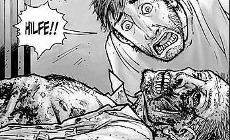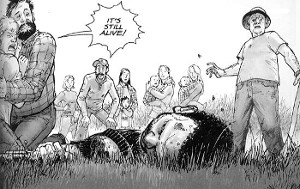|
__ __
__ __ __ __
__ __ __ __
__ __ __ __
__ __ __
"How many hours are in a day
when you don't spend half of them
watching television? When is the
last time any of us really worked to
get something that we wanted? The
world we knew is gone. The world of
commerce and frivolous necessity has
been replaced by a world of survival
and responsibility. An epidemic of
apocalyptic proportions has swept
the globe causing the dead to rise
and feed on the living. In a matter
of months society has crumbled, no
government, no grocery stores, no
mail delivery, no cable TV. In a
world ruled by the dead, we are
forced to finally start
living."
__ __
__ __ __ __ __
__ __ __ __ __
__ __ __ __ __
Recovering
from a near fatal gunshot wound,
Officer Rick Grimes wakes up from a
coma in an empty hospital room. In
fact, all of Harrison County Memorial
appears to be deserted -- or
abandoned. Well, maybe not quite
abandoned as all the dazed and weak
Grimes can find -- wherever he turns,
are masses of the undead ... E'yup. At
some point while he was out of it, the
dead have risen and begun feasting on
the living: Zombieapocalypse. (Don't
you hate it when that happens? Reason
#435 of why I hate hospitals.)

Unsure
of what's going on, the desperate and
confused Grimes manages to fight his
way out of the hospital and makes a
bee-line for his home, where
hopefully, his wife and son are
waiting for him. They aren't. And the
whole town is just as abandoned as the
hospital -- except for all the zombies
shuffling around trying to eat him.
Combine all that with the horrors he's
witnessed since waking up, Grimes
starts to unravel -- until he's gonged
over the head with a shovel.
Grimes
eventually wakes up to an apology from
Morgan Jones. Seems his young son,
Duane, thought Grimes was one of those
things. Jones goes on to
explain what happened (-- but
not how or why), and
basically, within a span of several
weeks civilization as we knew it has
collapsed. He also says that when the
crisis began, the government urged
citizens to head to any major city to
be better protected from the outbreak.
(So FEMA would be in charge
during a zombie invasion? Man, no
wonder we're always screwed in these
things.) This news perks Grimes
up: his in-laws live in nearby
Atlanta, so he figures Lori, his wife,
took their son, Carl, there and makes
plans to go and find them.
You
get the sense that Jones doesn't have
the heart to tell him what a
monumentally bad idea that is -- since
all the major cities have been overrun
and saturated with the not-quite-dead,
but he remains silent and declines to
go with him. After a quick raid of the
Sheriff's station's arsenal, and
several pointers on how to take a
zombie out, Grimes commandeers a
cruiser and heads toward Atlanta,
holding onto the one thing that's
keeping him sane: seeing Lori and
Carl again...

...Author
Robert Kirkman swears his main goal in
The
Walking Dead
is not to scare people, and at that he
succeeds. Now don't get me wrong;
there's plenty of creepy and ghoulish
things to be found in these panels, but
at it's heart, these books are more
Soap Opera than Horror Movie. And
don't let that scare you off, either. Panel
after panel of nothing but zombie
carnage may sound like a great idea,
but would probably grow tedious by
issue #7 or 8. It's the human element,
not the zombie element that makes this
thing work: they're here; they're dead
(and
trying to eat you); get used to
it. That is the crux of his narrative.
So
Kirkman focuses instead on Grimes and
his efforts to keep a rag-tag
collection of survivors alive and
safe. Our protagonist finds Atlanta in
ruins and soon falls into a deathtrap, only
to be saved by Glenn -- a former pizza
delivery boy, who sneaks into the city
for provisions. Once safely out of the
city, he leads Grimes back to a
refugee camp, consisting of about a
dozen or so survivors, including --
rather miraculously, Lori and Carl,
who were
shepherded there by Shane, Rick's
friend and fellow deputy. This reunion
is a happy occasion -- except for
Shane, who has a thing for Lori that
seemed to be bearing much fruit with
Rick presumed dead.

Things
begin to heat up after several raids
into Atlanta for provisions and
firearms. Shane -- the de-facto
leader, thinks they need to stay put,
so when the army comes, they'll be
easy to find. But Grimes doesn't think
help is coming any time soon and
believes staying in one spot is a real
bad idea; for more and more zombies
are stumbling into the camp with each
passing day. As
leadership slowly shifts from Shane to
Grimes, things come to a head when the
camp is attacked and several of the
group are killed. Shane then snaps and
blames everything on Grimes -- things
were going fine until he showed
up. They fight, and when Lori comes to
Rick's defense, angered by this
perceived betrayal, Shane flees into
the woods. And when Grimes goes after
him, he realizes too late that Shane
is going to kill him. But unbeknownst
to either man, young Carl followed
them and shoots Shane first, killing
him. And that pretty much
wraps up Volume I.
Volume
II opens with a flashback revelation
that on the road to Atlanta, Lori and
Shane had a consensual sexual
encounter. And to compound matters
even further, Lori is now pregnant;
and who the heck knows who the father
is. In a different time that
infidelity might have mattered, but
things are far, far from normal.
With
winter settling in, Grimes rallies his
troops and they all pile into a
Winnebago to search out some much
needed supplies, and warmer and safer
surroundings, away from the city. (Winter
has come; a blessing as the zombies
appear to freeze solid, and a curse
due to the lack of heat.) And
in one truly disheartening scene among
a ton of disheartening scenes, someone
realizes it's Christmas, but Grimes
tells them to stifle that talk, not
wanting to pile up anymore grief on
the children of their group. On the
road they pick up a few more
stragglers and find a gated community
surrounded by a large stone wall that
appears to be a perfect place to bivouac
for awhile. They clear out a house and
find plenty of food, and hope to find
more of the same in the other houses
the next morning. It seems like a good
plan, almost too good to be true. And
we all know what happens in zombie
movies when things start to go good,
right?
Right.
Turns
out the
stone walls weren't keeping the
zombies out; they were keeping the
zombies in. And as things quickly go
in the crapper, the refugees escape, barely,
but not without a few more casualties.
Running out of food, gas and hope, the
group finds another improbable oasis
with a fenced in farm. Hershel, the
owner, lives there with his six kids
and a couple of neighbors. And it's
his medical skills as a veterinarian
that saves Carl from a gunshot
suffered during a hunting accident. He
welcomes them to stay until Carl
recovers, and things settle down for a
while until a lone zombie wanders by.
When Grimes moves to put it down, this
causes Hershel to go ballistic. Seeing
them as infected patients that can be
cured of what ails them, the farmer
can hardly believe that these
strangers have been killing the zombies all
along. In fact: all the ones he's come across
he kept locked up in the barn -- well
over a dozen. And I think we all know
how this is going to turn out, right?
Right.
Who
dies and who lives to show up in
Volume III I'll leave up to you to
find out.

Like
I said before, The
Walking Dead
is a lot more Days
of Our Lives
than Day
of the Dead;
group dynamics, crisis
management, adulterous affairs,
betrayal, and lots and lots of
screwing punctuated by the occasional
zombie attack. And all I can say is,
so far so good. Kirkman really isn't
breaking any new ground here,
convention wise, but as author Stephen
King once purported: [paraphrasing] It
doesn't matter that the idea is cliché,
but what your story does with that
cliché. And Kirkman has sustained
that cliché and my interest to see
what happens next to these people for
over 40-issues. So at least to me, he
must be doing something right.
The
art shows the chaos in stark black and
white and subtle gray tones. Tony
Moore's work in the first collection
shows a more defined line, cleaner
details and characters, while Adlard's
work is more blunt and to the point.
Both artists can handle the shambling
hordes and deliver the grue, so either
style works for the subject matter,
and my only complaint is with Adlard, who has trouble discerning one person
from another, and because we're
dealing with almost twenty characters,
it's sometimes hard to tell who the
heck is who.
One
thing that always bugged me about this
genre, from the very beginning, was
the anatomy of the living dead. In
Kirkman's story, it appears to be an
infection and you don't need to be
bitten to become a zombie. All you
have to do is die (--
a bite just seems to speed up the
process.) Somehow the brain
reactivates, and I assume some kind of
electrical impulses from this organ
keeps the body going, and the brain is
the key. There are several instances
where a zombie's head is lopped off,
rendering the body inert, but the head
continues to chatter about, making a
blow to the cranium the critical step
in stopping them. Which in my
thinking, would make a machete and a
simple hammer the most effect zombie
fighting tools. Step one, lop off the
head, step two, a whack to the
forehead. Lather. Rinse. Repeat.
But
is this some airborne virus gone
amuck, or is there a supernatural
explanation for this plague of the
undead. I ask this because -- and I
usually don't like to bring too much science
into my science fiction -- but
the question has to be asked: If these
people are really dead, it'd take
about a week (--
depending
on environmental factors --) for
decomposition to reduce the corpse to
bones. Before that, necrosis,
bacteria, maggots and other factors
would reduce these bloating menaces to
putrefied soup within a few days. (Something
else that's never been touched on that
I'm aware of in film or fiction, but, my god, can you imagine what the world
smells like now? And I don't want to
think of the diseases being spread by
vermin with all that rotting flesh
lying around.) My point of all
this is: unless this is supernatural
in nature (-- then we can throw
science and biology out the window),
or the virus somehow mutates the body
and reduces the decaying process
greatly (-- some decomposition
has to be occurring -- I mean, just
look at them), the
zombieapocalypse is a lot more
survivable than one might initially
think. All it would take is a matter
of holing-up and waiting for nature to
take it's course, and then have
protective protocols for the newly
deceased and we're gold. Easy. Sounds
like the perfect plan, right?
Right.
Wait
a sec -- aw crap...
|